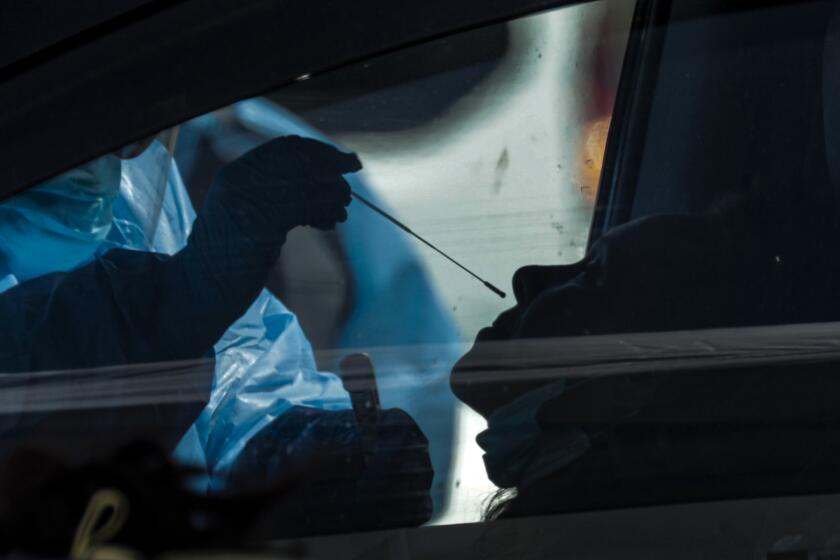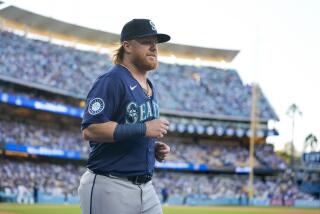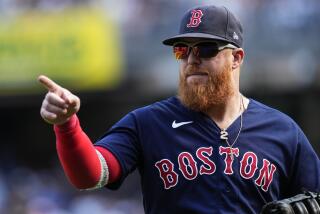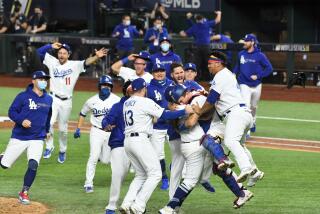Q&A: Did Justin Turner put Dodgers at risk by celebrating their World Series championship?
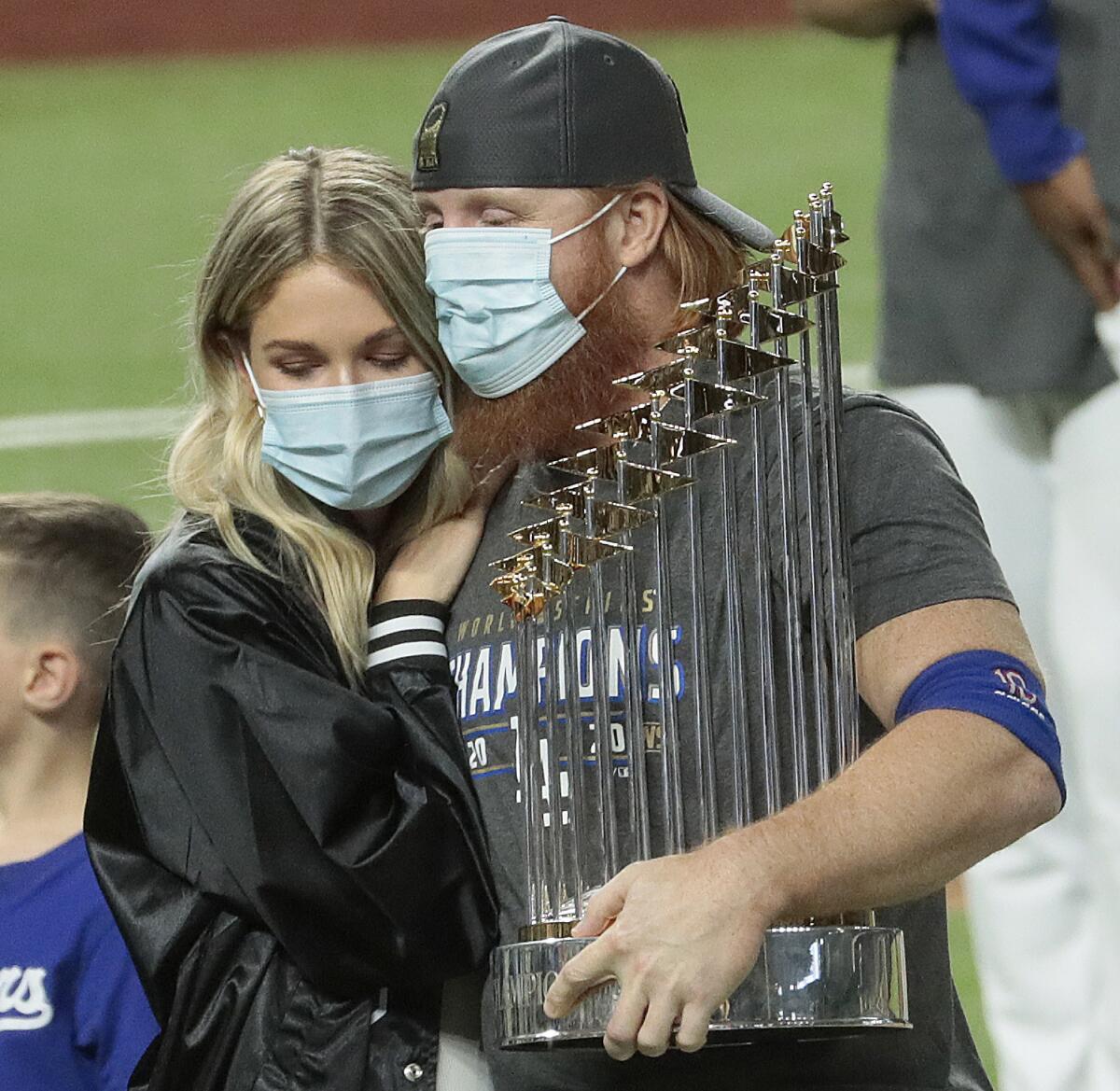
- Share via
Maybe Dr. Anthony Fauci’s wayward pitch to open the 2020 Major League Baseball season was the first sign that trying to play ball in the midst of the COVID-19 pandemic would be a difficult balance.
The truncated season ended with Dodgers third baseman Justin Turner being pulled from Game 6 of the World Series after a coronavirus test came back positive. Less than two hours later, he broke his isolation and returned to the field to celebrate the championship with his teammates and their families. During much of that time, he wasn’t even wearing a mask.
It was an impulsive, if understandable, decision. And it broke the rules that teams agreed to this year as a condition of play.
But how much danger did his presence pose to those with whom he celebrated Tuesday night?
A bit of the old Fauci magic — science — may offer some insight.
How risky was it for him to celebrate on the field considering he already played 7 innings?
Turner said after the game and celebration that he did not feel the least bit sick despite his positive coronavirus test.
“I feel great, no symptoms at all,” he tweeted.
But even without any outward symptoms of COVID-19, he was likely within the most contagious window of his coronavirus infection. Scientists say that people who are newly infected are prone to spread the virus for at least two days before their first signs of illness, and that their contagiousness peaks about 18 hours before the first sign of fever, ache, cough or other symptoms set in.
One report from China found that half of those infected were still shedding the virus 19 days later.
A study of COVID-19 patients and the people they likely infected suggests the coronavirus can spread for more than two days before symptoms appear.
In research studies, many of the most prolific coronavirus spreaders were either asymptomatic or pre-symptomatic, meaning they would go on to develop COVID-19 symptoms over the next two or three days. But even people who never developed symptoms proved quite capable of passing the virus along — both in lab-based simulations and in real-life contact-tracing studies.
Baseball players were being tested for infections daily, and the test administered under MLB guidelines on Monday detected a viral load high enough to trip it. And another test Tuesday confirmed it. So regardless whether Turner goes on to develop symptoms, we know he was in this early, and highly contagious, stage of infection when he celebrated on the field.
How likely is it that he infected anyone?
At least moderately likely.
Anyone lingering within a couple feet of Turner during this period would have been at risk of drawing in some virus expelled in his breath. That’s possible even during the period when he was masked, but the dose of viral particles that could be sucked in from an unmasked Turner would likely be higher — and more likely to cause illness.
And masked or not, his ability to infect others would be enhanced if he was whooping, hollering or just breathing hard from exertion or excitement.
The Centers for Disease Control & Prevention recently updated its guidance to note that spending 15 minutes in close proximity to an infected person, either all at once or over the period of a day, puts someone at high risk of infection. The CDC dictates that such an exposure should be followed by 14 days of self-isolation and a twice-daily check of symptoms.
That’s already likely to be the prescribed behavior for all of Turner’s teammates, who in the first seven innings of the title-clinching game almost certainly logged a total of 15 minutes of proximity to Turner in the dugout.
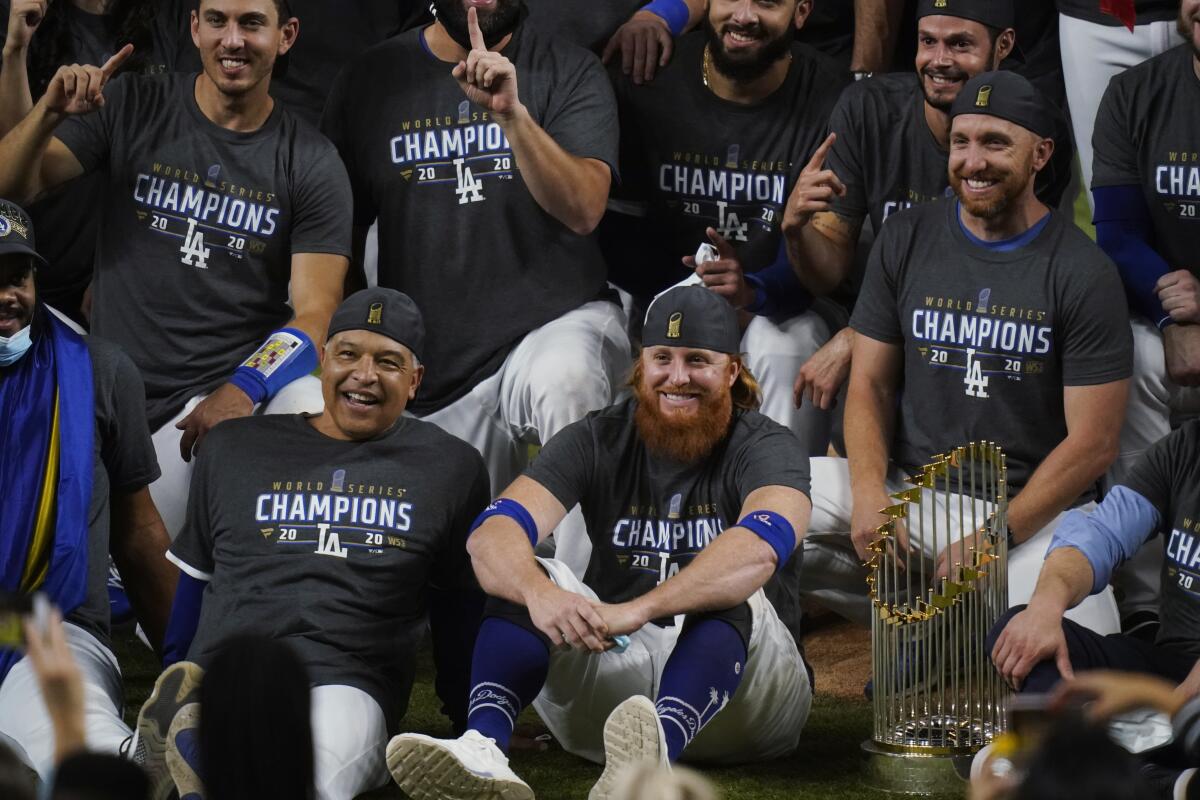
When he emerged about an hour after the game ended, Turner hugged teammates and some of their wives — close but relatively brief encounters. He briefly sat next to Dodgers manager Dave Roberts, a survivor of Hodgkin lymphoma, as they posed for a team photo without wearing masks.
That was a particularly risky move. The fact that neither man wore a mask allows, potentially, for a larger dose of virus to flow from Turner to Roberts. The larger the dose, the greater the risk that its recipient will become very ill.
Further, because Roberts has a history of a cancer, he already faces a greater risk of developing severe illness if infected.
After sharing a dugout with teammates, what could a little celebrating hurt?
Well, there’s the trophy to consider.
Remember in the opening days of the pandemic when we approached our mailboxes with gloves on? When we could not slather on enough hand sanitizer after any public outing? That was because the one thing that scientists have been sure about since the beginning is that the respiratory droplets in which the virus is suspended can remain viable for “hours to days on surfaces made from a variety of materials,” according to the CDC.
There, they can be picked up by others’ hands and brought to their eyes, nose or mouth, seeding yet another infection.
When Turner first emerged from his brief isolation in a team doctor’s room, he posed for pictures near the mound with both hands clutching the iconic Commissioner’s Trophy. Turner’s wife, Kourtney Pogue, gripped his arm. Neither wore masks.
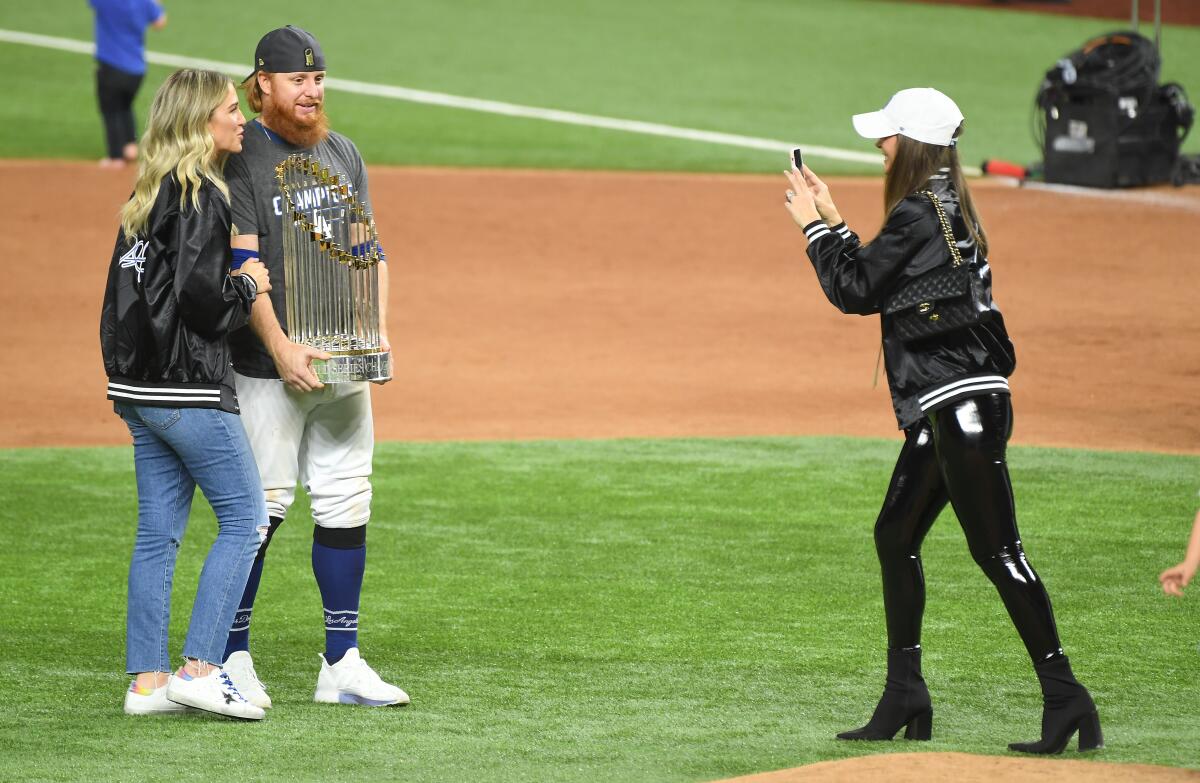
Let’s say that before turning the trophy over to teammates to kiss, clasp, hug and pass on, Turner had done what we’re all guilty of doing anywhere from 16 to 23 times an hour — touched his face. That not only goes for wiping his mouth, nose or eyes, but also for stroking his trademark red beard.
And let’s just imagine that, in the heat of the moment, he did not stop to wash his hands or slather them with sanitizer.
Follow the trophy.
How long will it take to find out if other Dodgers are infected?
The incubation period for the coronavirus — the amount of time between exposure and developing a detectable viral load — can be as little as two or three days and as long as two weeks. But typically, it take four to five days for a dose of virus taken into the cells lining the mouth, nasal and respiratory system to multiply and reach a concentration that can be detected by a PCR test, the kind that looks for the genetic signature of the virus.
Again, the dose of exposure matters, and that can be minimized by limiting your contact with an infected person and wearing a mask.
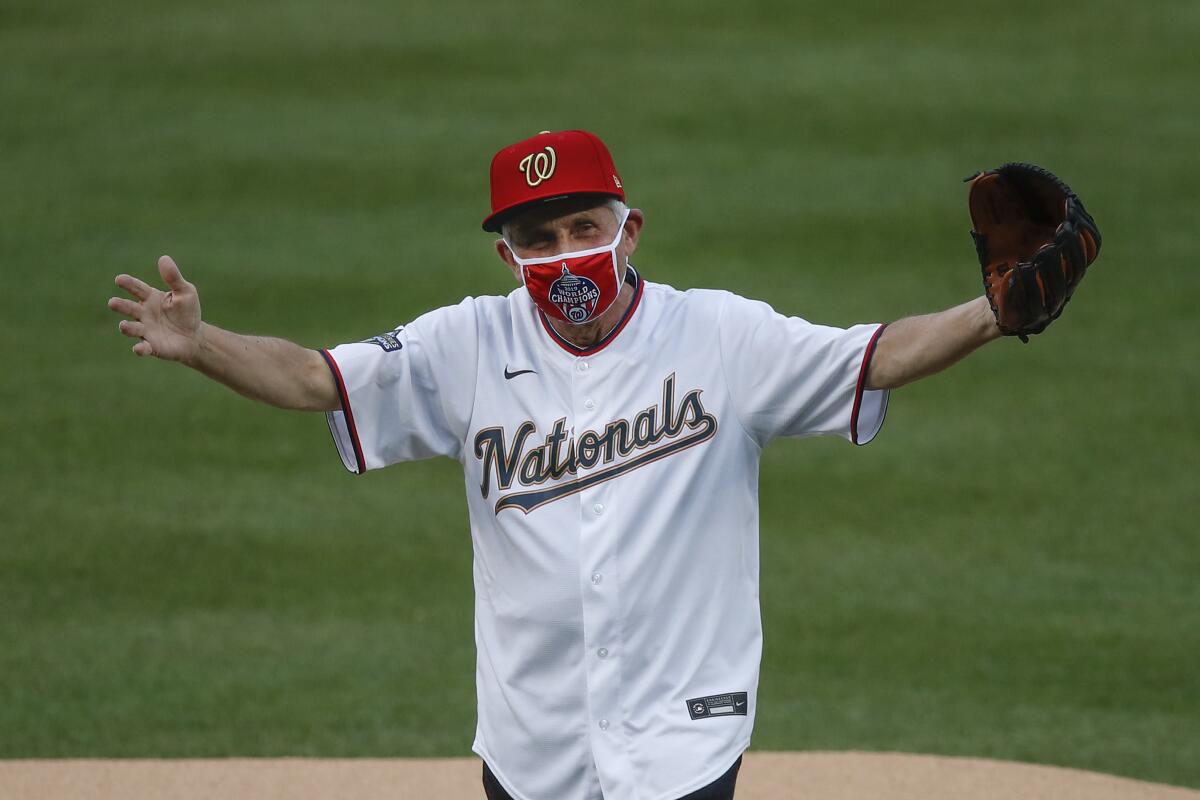
Think of Fauci’s opening-day pitch as a lesson for us all in this pandemic. The nation’s chief infectious disease doctor not only delivered the ball well outside the batter’s box, his pitch wouldn’t have reached the plate even if it had come in straight.
Translation: If you’ve been exposed to coronavirus infection, or have tested positive, make sure nobody could catch what you’re throwing by wearing a mask and keeping your distance from others. Just take your ball and go home.
